
Throughout Africa, Asia, and Latin America public health professionals and paraprofessionals work to control serious, frequent and preventable causes of death and sickness among women and children. Despite international agreement about which health programs to implement and huge investments to support them, avoidable deaths remain high. One reason is the inadequate quality with which programs are implemented.
Assessing Child Survival Programs in Developing Countries provides local health system managers with basic principles for rapid precise program monitoring and evaluation in difficult tropical conditions. Joseph Valadez explains how to adapt Lot Quality Assurance Sampling (LQAS) as used in industrial quality control more than half a century ago, to assess health program coverage and technical quality of service providers. He shows that by examining no more than 19 children from a health facility catchment area a manager can judge whether coverage with child survival interventions has reached a minimal level, and how to observe health workers perform a task 6 times to judge their technical competency.
Joseph Valadez demonstrates that quick assessment is not necessarily dirty, and can provide the information needed to enhance child survival throughout the developing world. In that spirit Assessing Child Survival Programs in Developing Countries is a path breaking text book of modern health services research that both practitioners and students will find indispensable and understandable.
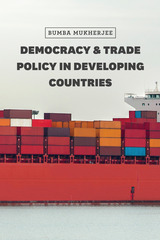
Mukherjee offers the first comprehensive cross-national framework for identifying the specific economic conditions that influence trade policy in developing countries. Laying out the causes of variation in trade policy in four developing or recently developed countries—Brazil, India, Indonesia, and South Africa—he argues persuasively that changing political interactions among parties, party leaders, and the labor market are often key to trade policy outcome. For instance, if workers are in a position to benefit from opening up to trade, party leaders in turn support trade reforms by decreasing tariffs and other trade barriers.
At a time when discussions about the stability of new democracies are at the forefront, Democracy and Trade Policy in Developing Countries provides invaluable insight into the conditions needed for a democracy to survive in the developing world in the context of globalization.
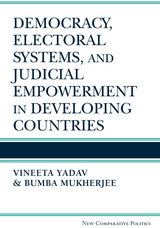
Moving next to de facto independence, Yadav and Mukherjee bring together data from 103 democracies in the developing world, complemented by case studies of Brazil, India, and Indonesia. Honing in on the effects of electoral institutions, the authors find that, when faced with short time horizons, governments that operate in personal vote electoral systems are likely to increase de facto judicial independence whereas governments in party-centered systems are likely to reduce it.

The volume, divided into four main sections, addresses: the role of exchange rates in stabilization programs and the adjustment process; the importance of exchange rate policy during liberalization reform in developing countries; exchange rate problems relevant and unique to developing countries, illustrated by case studies; and the problems defining, measuring, and identifying determinants of real exchange rates. Authors of individual papers examine the relation between commercial policies and exchange rates, the role of exchange rate policy in stabilization programs, the effectiveness of devaluations as a policy tool, and the interaction between exchange rate terms of trade an capital flow. This research will not only prove crucial to our understanding of the role of exchange rates in developing countries, but will clearly set the standard for future work in the field.
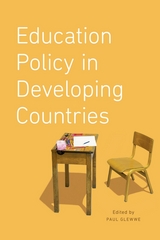
Surveying many aspects of education—from administrative structures to the availability of health care to parent and student incentives—the contributors synthesize an impressive diversity of data, paying special attention to the gross imbalances in educational achievement that still exist between developed and developing countries. They draw out clear implications for governmental policy at a variety of levels, conscious of economic realities such as budget constraints, and point to crucial areas where future research is needed. Offering a wealth of insights into one of the best investments a nation can make, Education Policy in Developing Countries is an essential contribution to this most urgent field.


The creation and preservation of capable states is a lengthy, laborious, and multifaceted process, fraught with opportunities for failure and misspent resources. It requires time, commitment, innovative ideas, consensus building, new rules of the game, efficient design and resource allocation in technical assistance, and considerable good luck. By the mid-1990s, the imperative to improve government performance had been added to the development agenda precisely because of greater awareness that neither markets nor democracies could function well--or perhaps function at all--unless governments' efficiency, effectiveness, and responsiveness are improved.
This publication seeks to help understand how governments can be encouraged to perform better and how state capabilities can be developed in ways that allow markets and democracies to flourish. The contributors draw comparative lessons from specific efforts designed to enhance human resource development in the public sector, to strengthen organizations that contribute to the public purpose of government, and to reform the institutions that set the rules for economic and political interaction.
Getting Good Government will be of interest not only to public officials and public management and policy analysts, but also to political scientists and international development specialists.

Millions across the world face the daily challenge to find enough food to survive. Hunger is on the rise globally, with more than 1.2 billion people suffering from food insecurity. Rising prices are further restricting food access.
In this deeply informative study, Majda Bne Saad identifies the causes for global hunger embedded in the current global political and economic system and highlights the key challenges facing food deficit countries. She shows how Western countries share the blame for global hunger through their support for subsidies to agricultural production and biofuels, which have created new challenges to food security worldwide.
Bne Saad argues that, as world population rises from 7 billion to 9.2 billion by 2050, there needs to be a ‘second green revolution’ to grow more food. She looks at the factors constraining low-income nations from achieving food security and considers policies which could generate income and enhance individuals' entitlement to food.
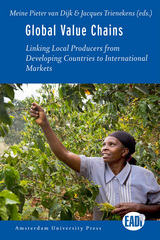
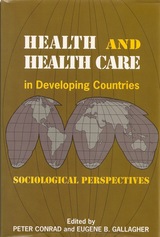
In this seminal collection of articles on health care in the Third World, sociological perspectives are applied to medical issues in revealing ways. Fourteen essays (all but two of which are original to this volume) examine the social production of health, disease, and systems of care throughout the developing world. The volume covers a range of areas—central Africa, Nigeria, Singapore, Taiwan, Indonesia, Nepal, China, United Arab Emirates, Oman, and Mexico—and a broad scope of topics, from emergency care, the AIDS epidemic, and women's health care, to public health programs and national health care policies.
Contributors address the central question of whether health systems in developing areas should emphasize the role of clinical medicine and individual physicians or community and preventive medical resources. The major health problems faced by these societies—inadequate sanitation, infectious disease, high infant-child mortality, and a lack of family planning—indicate the greater need for health educators and public health workers despite many poor nations' desire for Western doctors. Other topics that are examined include the process of seeking medical aid; the relationship between traditional and modern medicines; medical education, hospital care, and communication between doctors and patients in developing countries; and the relevance and application of sociology in Third World settings.
This volume seeks to draw attention to the significance of medical sociology for understanding Third World health problems and to show how examining developing societies may necessitate reframing or modifying some Western sociological notions. In addition, these essays stretch the boundaries of medical sociology to include Third World issues.

In Mexico City or Nairobi or Manila, a young girl in one part of the city is near death with measles, while, not far away, an elderly man awaits transplantation of a new kidney. How is one denied a cheap, simple, and effective remedy while another can command the most advanced technology medicine can offer? Can countries like Mexico, Kenya, or the Philippines, with limited funds and medical resources, find an affordable, effective, and fair way to balance competing health needs and demands?
Such dilemmas are the focus of this insightful book in which leading international researchers bring together the latest thinking on how developing countries can reform health care. The choices these poorer countries make today will determine the pace of health improvement for vast numbers of people now and in the future. Exploring new ideas and concepts, as well as the practical experiences of nations in all parts of the world, this volume provides valuable insights and information to both generalists and specialists interested in how health care will look in the world of the twenty-first century.
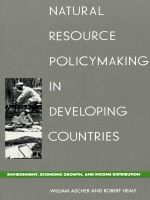
This book is about the links that tie resource use, environmental quality, and economic development, and the way in which those links are affected by the distribution of income and resource ownership. The links may be relatively simple, as in the case of peasant farmers too poor to conserve resources for the future and with nothing to gain from sound environmental practices. Or they may be very complex—as the authors find when they demonstrate how achievement of higher incomes by the rich can increase environmentally destructive behavior by the poor. Many of the links in some way involve rural land use, whether for agriculture or forestry. Natural Resource Policymaking in Developing Countries argues that the policies that matter are not merely those dealing with resources and the environment, but a much broader set that includes income distribution and asset ownership.



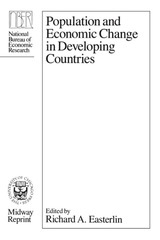
"An important landmark in the growing field of economic demography."—Dudley Kirk, Journal of Developing Areas

Advanced countries of the world have taken a hundred years to work out systems of primary education reasonably well adapted to the needs of their communities and to the varied capacities of the children in their schools; today many of the developing countries are trying to do the same thing in a decade. At first sight it might appear that with the help and experience of the developed word they could leap a century and establish straight away something approaching the modern classroom without having to plod through the stage of dreary formalism that marked the first fifty years of our system of compulsory education, in much the same way that many of them have been ushered into the air-age without ever knowing the smoke and dirt of a nineteenth-century railway system.
As Director of Education for New Zealand, with responsibilities also in Western Samoa and in New Zealand's Pacific Islands dependencies, for many years C. E. Beeby had to deal with two educational systems at very different levels of development. He reluctantly comes to the conclusion that new countries cannot simply adopt the systems that have evolved in other nations. He argues that an educational system of high quality must develop in distinct stages through which all systems, at least of a certain type, must pass, and which, though they may be shortened, cannot be skipped. Two main factors determine the stage of development of any primary school system: the level of general education of its teachers, and the length and type of their professional training.
Beeby emphasizes the need for young countries to maintain high educational standards in the face of an explosion of demand for schooling. He comments controversially on the respective roles of the economist and the educator in educational planning and on the need for a truly educational theory of growth to balance the economic theories that have tended to dominate educational planning. In a chapter as significant for developed countries as for emergent ones, he discusses conservatism in education and the peculiar pattern of resistance to change among the teaching profession. Beeby concludes with an examination of the difficulties young nations encounter in attempting to solve some of their problems through the application of new educational technology, and he describes the investigation that must be undertaken before one may assume that the new techniques and media can materially affect educational planning in these countries over the next decade.


Other conclusions include the apparently mutually reinforcing nature of tax simplification and tax rate reduction, and the role of indirect tax reforms (such as the value-added tax) in successful reform undertakings.

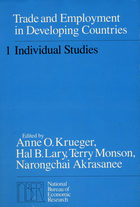
Ten countries are studied: Brazil, Chile, Colombia, Indonesia, the Ivory Coast, Pakistan, South Korea, Thailand, Tunisia, and Uruguay. The contributors to the volume analyze the link between trade strategies and employment within a common framework, and the analyses of trade policy include the level and structure of protection, the relation of trade policy to labor demand, the labor intensiveness of trade, and the extent of distortions in factor markets and their effects on trade.
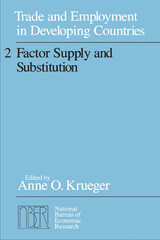
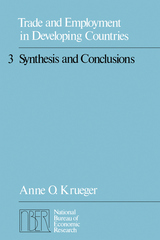
READERS
Browse our collection.
PUBLISHERS
See BiblioVault's publisher services.
STUDENT SERVICES
Files for college accessibility offices.
UChicago Accessibility Resources
home | accessibility | search | about | contact us
BiblioVault ® 2001 - 2025
The University of Chicago Press









